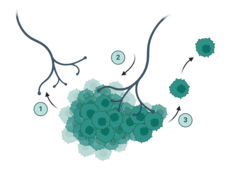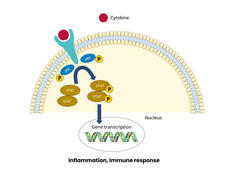Cancer Currents: An NCI Cancer Research Blog
A blog featuring news and research updates from the National Cancer Institute. Learn more about Cancer Currents.
-
Breast Cancer May Spread by Recruiting Nearby Sensory Nerves
A new study may provide important new insights into breast cancer metastasis. Blood vessels within tumors release a molecule that draws sensory nerves closer to the tumors, the study shows. This close proximity turns on genes in the cancer cells that drive metastasis.
-
Clinical Trial Results Support Uninterrupted Use of Imatinib for Some Gastrointestinal Stromal Tumors
Trial participants who stopped imatinib had a more rapid worsening of disease, a shorter time until resistance, and did not live as long as participants who continued the therapy uninterrupted.
-
Study Identifies Hundreds of Potential Targets for Cancer Drugs
Researchers have identified hundreds of promising targets for existing drugs or potential new cancer drugs. The findings relied heavily on proteogenomic data from more than 1,000 tumors representing 10 types of cancer released last year by NCI's CPTAC program.
-
DNA from Ancient Viruses Helps Many Cancers Grow
DNA fragments from retroviruses that are millions of years old appear to be active in a variety of cancers, a new study found. One virus-derived DNA fragment in particular, known as LTR10, turns on cancer-related genes in multiple types of cancer.
-
Growing the Cancer Research Pipeline by Expanding Opportunities
NCI Director Dr. Kimryn Rathmell and Division of Cancer Biology Director Dr. Dan Gallahan explain how the R15 grant program supports researchers at smaller institutions and encourages students to pursue careers in cancer research.
-
FDA Approves Engineered Cell Therapy for Advanced Synovial Sarcoma
FDA approved afami-cel (Tecelra) to treat metastatic synovial sarcoma, a type of soft tissue sarcoma. The approval is for patients who have already received chemo and whose tumors are positive for MAGE-A4. Afami-cel is the first T-cell receptor therapy approved for cancer.
-
To Combat Cancer Treatment Resistance, Researchers Try Leveraging Evolution
Scientists have developed a strategy for treating cancer that takes advantage of tumors’ ability to rapidly evolve and turns it against them. It involves intentionally making some tumor cells resistant to a specific treatment from the get-go.
-
Can Chemo Help KRAS Inhibitors Work Better Against Pancreatic Cancer?
Two new studies in mice show that adding chemotherapy to the experimental KRAS inhibitor MRTX1133 greatly reduced tumor growth and spread compared with either treatment alone.
-
Understanding the Risk of Second Cancers After CAR T-Cell Therapy
In late 2023, FDA announced it was investigating instances of second cancers following treatment with CAR T-cell therapies. In this Q&A, NCI’s Dr. Stephanie Goff explains what’s known about the issue, stressing that second cancers “of any kind are rare.”
-
Drug Combo JAKs Up Immunotherapy in Two Clinical Trials
Scientists have been searching for ways to make immune checkpoint inhibitors work for more patients. In two trials, researchers explored a possible role for JAK inhibitors, which dampen chronic inflammation.
-
More Immunotherapy Options Approved for Treating Endometrial Cancer
People with advanced endometrial cancer now have new FDA-approved treatment options: pembrolizumab and durvalumab, paired with chemotherapy, for tumors with a genetic change called mismatch repair deficiency. The agency also expanded the approved uses of dostarlimab for the disease.
-
Screening People at High Risk for Pancreatic Cancer May Help Them Live Longer
Regular imaging tests to monitor the pancreas may help detect pancreatic cancer at an early stage in people who are at high risk, a new study suggests. This type of surveillance could also help improve how long these patients live.
-
FDA Approves HPV Tests That Allow for Self-Collection in a Health Care Setting
The expanded approval of two HPV tests allows the patient to collect a vaginal sample themselves in a health care setting, rather than a health provider collecting a sample during a pelvic exam. The availability of a self-collection option in health care settings could help widen access to cervical cancer screening.
-
Treating the Whole Person: How Cancer Centers Are Addressing Social Needs
While treating people’s health-related social needs has always been a part of health care in one form or other, cancer centers and community cancer clinics increasingly are viewing the people they treat through a social lens and addressing social needs—including transportation, food, and housing—as part of patient care.
-
Lorlatinib Slows Growth of ALK-Positive Lung Cancers, May Prevent Brain Metastases
Lorlatinib (Lorbrena) is superior to crizotinib (Xalkori) as an initial treatment for people with ALK-positive advanced non-small cell lung cancer, according to new clinical trial results. Treatment with lorlatinib also helped prevent new brain metastases.
-
Trial Establishes Preferred Treatment for Some People with Esophageal Cancer
For people with locally advanced esophageal cancer, a chemotherapy regimen called FLOT is the preferred treatment, according to results from a large clinical trial. People treated with FLOT lived much longer than those treated with the CROSS regimen.
-
Program Helps Medically Underserved, Minority Cancer Survivors Be More Active
A program in Texas helped minority and medically underserved cancer survivors get much more physical activity, according to a new study. Participants also reported improved physical functioning and quality of life.
-
Tumor Signatures May Help Explain Global Differences in Kidney Cancer Rates
By analyzing patterns of DNA mutations in kidney cancers from people around the world, researchers have discovered new clues about possible causes of the disease. Identifying these mutational signatures might lead to strategies for preventing kidney cancer.
-
How Breast Cancer Risk Assessment Tools Work
Drs. Ruth Pfeiffer and Peter Kraft of NCI’s Division of Cancer Epidemiology and Genetics discuss how breast cancer risk assessment tools are created and how people can use them to understand and manage their risk.
-
Durvalumab Extends Lives of People with Early-Stage Small Cell Lung Cancer
The immunotherapy drug durvalumab (Imfinzi) can help people with early-stage small cell lung cancer live longer, results from a large clinical trial show. Three years after starting treatment, nearly 60% of people who received the drug were still alive.


















